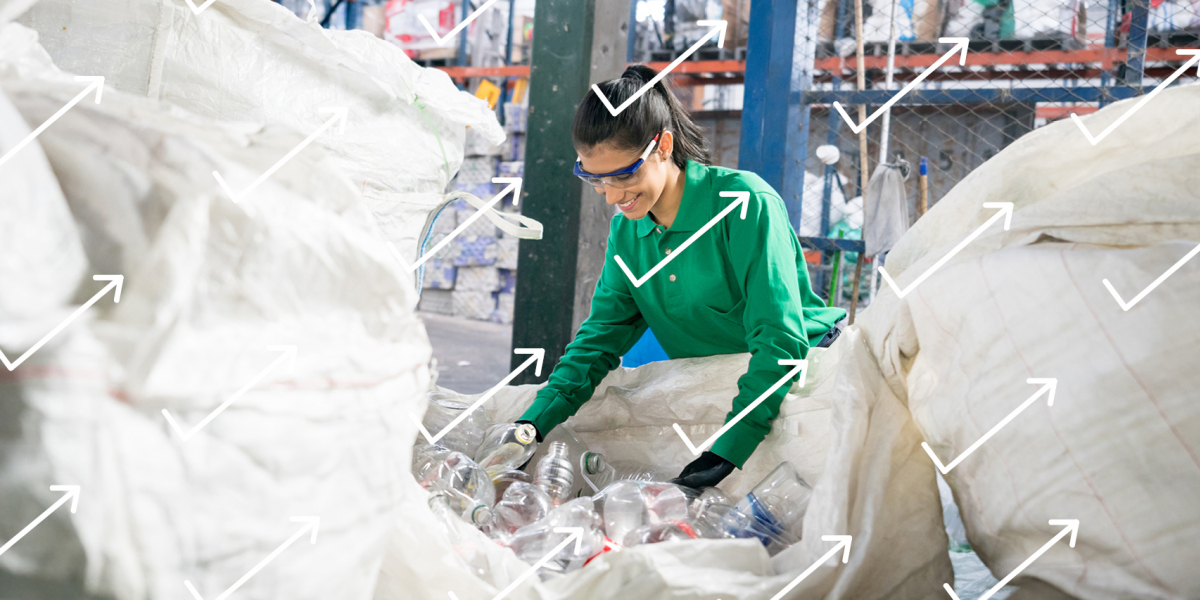
April 29, 2020
Guest post by Andrew Macdonald
This post is part of Smart Prosperity Institute’s Smart Stimulus Project. To see other posts from this project, click here.
Want to receive the latest analysis and insights on smart stimulus for a resilient economic recovery? Sign up for our monthly updates here.
Before COVID-19 hit the world, things were really starting to look up for the plastics recycling industry. Consumer awareness was up. Governments were advancing legislation – like the European Union’s adoption of recycled content minimums and Canada’s pledge to ban single-use plastics as early as 2021. And businesses were following suit – with corporate signatories to the Ellen Macarthur Foundation’s Global Commitment reaching 400 by October 2019. These factors all contributed to an urgently needed surge in investment interest.
One indicator of pre-COVID-19 investment activity came in last week’s ‘The Recycling Industry and the Supply Chain in a Pandemic’ webinar, where Stephanie Baker of US plastic recycler KW Plastics noted that, in the past sixteen months, there had been a “big uptick” in corporations qualifying recycled resins for use in new applications. Ms. Baker added, however, that this surge of innovation stopped abruptly with COVID-19.
It’s too early to say how COVID-19 will impact plastic sustainability commitments. Of note, however, was last week’s Association of Plastic Recyclers (APR) legislative update. APR reported that California, often a bellwether on environmental matters, intends to amend and move forward in this legislative session with Bill AB792, regarding minimal recycled content in plastic containers.
If government and business commitments related to plastic recycling do survive COVID-19 then a key question, which was burning long before the pandemic, is how will these targets be achieved?
Currently there is insufficient supply of higher quality recycled plastics (such as the rPET used in beverage containers) to meet demand. While aggressive measures to tackle COVID-19 -- including the virtual shutdown of non-essential economic activity, border restrictions, and the revision of material recovery facility (MRF) operating protocols -- have affected all recycling supply chains, they aren’t the root of the problem in sourcing high-grade recycled plastics.
An important aspect of the sourcing challenge is the need for investment. Notably, a recent Forbes article reports that there was considerable investor interest in plastics recycling leading up to COVID-19. A report by US private equity firm Closed Loop Partners (CLP) details diverse, scalable technologies that already exist, and which can help meet demand for high-grade recycled plastics. Investment in MRFs is also needed in the US -- more so than in Canada, which has a robust network of plants that are not at capacity. In the Forbes piece, CLP’s Martin Aares suggests that investing in domestic recycling infrastructure can help mitigate risks associated with our highly interconnected global supply chains -- risks that COVID-19 has exposed in dramatic fashion.
As noted by SPI, Canada’s stimulus spending in response to the inevitable recession can either reinforce our existing climate investments, or completely undermine them. Direct stimulus could, for example, include further investment in the chemical recycling of plastics, a space of considerable Canadian cleantech innovation for which the federal government recently provided funding. In terms of tax system stimulus Canada could take a hard look at how the UK plans to implement its plastic packaging tax. And regarding regulatory driven stimulus, the federal and provincial governments must follow-through with the Canada-wide Action Plan on Zero Plastic Waste priorities, such as Extended Producer Responsibility (EPR) and National Performance Standards.
Heightened awareness of the critical role recycling plays in the supply chain may be an unanticipated but positive impact of COVID-19. Could this be an opportunity for more people to connect the dots between the ‘blue box’, manufacturing and sustainability? A key dot is understanding that recycled material is required for a vast array of products that many consumers may now more clearly see as essential -- such as the corrugated boxes carrying all their home deliveries, from food to n95 masks.
Interestingly, the high demand and limited supply of recycled materials because of COVID-19 means that, currently, fibre recyclers are fetching high prices for mixed paper and OCC (old corrugated containers). Conversely, plunging oil prices are driving down the cost of virgin plastics in comparison to recycled plastic alternatives -- a powerful disincentive to investment. The higher paper prices are almost certainly temporary, but even if that is the case the CEO of Closed Loop Partners commented to Waste Dive that: “To see a bright spot for the recycling industry in terms of paper prices going up is very positive…[it’s] also a recognition of how important recycling is to the domestic supply chain.”
How can the plastic recycling industry regain its investment traction in the face of economic recession? Corporations and governments must maintain their commitments; Canadian legislators must look hard at the three core policies put forth by SPI to kickstart a reverse supply chain for plastics; investors must pay attention to scalable technologies that integrate with existing infrastructure; and the plastic recycling industry must better communicate its important role in our current and future economy, and the major contributions it makes in reducing negative environmental impacts.
Andrew Macdonald is based in Toronto and provides consulting services focused on sustainable, circular economic solutions, works with the PAC Packaging Consortium sustainability team, and lectures at Ryerson University. Andrew can be reached at: awmacdonald55@gmail.com